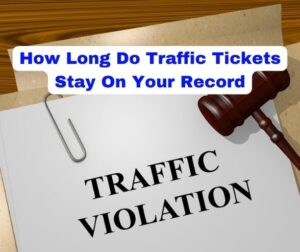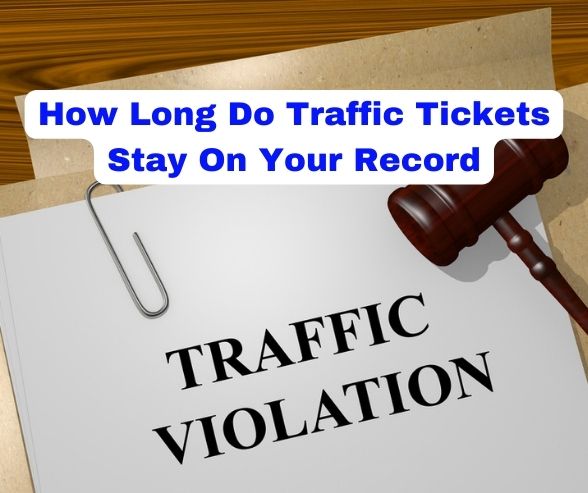Highlights
When Do Speeding Tickets Go Away
Do Citations Stay On Your Record
If you’ve been pulled over and given a ticket in Texas, you may be wondering how long it will stay on your record.
The answer depends on the severity of the offense, but generally speaking, most traffic tickets will remain on your record for at least three years.
Keep reading to learn more about traffic ticket records in Texas and what you can do to keep yours clean. See also…Texas Misdemeanor Lawyer.
How Long Speeding Tickets Stay On Your Record
Does A Speeding Ticket Last On Your Record
In Texas, traffic tickets generally stay on a person’s record for three years from the date of the conviction. During this period, the ticket will usually remain visible in state and national databases and can be accessed by court or law enforcement personnel.
However, it is possible to have tickets removed from records after they are paid or if other criteria laid out by the court have been met. Regardless of these options, it is important to note that trying to avoid paying fines associated with an offense is a criminal penalty under Texas law and should be taken seriously.
Different Types Of Traffic Tickets In Texas
Citation vs Ticket – Texas
 In Texas, traffic tickets can vary greatly depending on the infraction. Common moving violations such as speeding or failure to yield may result in a minor Class C ticket with fines and points associated. Meanwhile, serious and dangerous offenders can face Class B or Class A misdemeanor tickets, and incur charges such as community service hours, court costs, reinstatement fees, etc.
In Texas, traffic tickets can vary greatly depending on the infraction. Common moving violations such as speeding or failure to yield may result in a minor Class C ticket with fines and points associated. Meanwhile, serious and dangerous offenders can face Class B or Class A misdemeanor tickets, and incur charges such as community service hours, court costs, reinstatement fees, etc.
Depending on the gravity of the offense, repeat offenders can even face more severe punishments including more expensive fines, longer license suspensions/revocations, and even jail time. It is important for Texans to be aware of all their possible ticket types and understand the implications for each one so that they can stay safe on the road.
How To Clear A Traffic Ticket From Your Record
How Long Do Driving Infractions Stay On Your Record
Clearing a traffic ticket from your record can be a tedious process that involves investigating the particular court’s local rules, filing paperwork according to their timeline, and communicating with the court regularly. After identifying which tickets on your record are eligible for clearing, you may need to attend mandatory follow-up classes or pay fines associated with the ticket before moving forward.
After completing these steps, you will need to submit paperwork to prove that all required steps have been completed and that it is eligible for dismissal. If this is accepted by the court, you will receive a certificate that states the clearance of the ticket. It is important to ensure that you have taken all necessary steps when trying to clear a traffic ticket as any missteps can delay or prevent clearance in its entirety.
The Consequences Of Having A Traffic Ticket On Your Record
How Many Years Does A Ticket Stay On Your Record
The consequences of having a traffic ticket on your record are not to be taken lightly. The nature and severity of the penalties for any given infraction will depend upon the jurisdiction and, potentially, the specific details of an individual’s case. Overall though, a traffic ticket can often result in an increase in insurance premiums, an amendment to one’s driving record, or even license suspension or revocation.
It is best to consult with legal counsel if you have been issued a ticket and need help navigating the penalties and consequences that accompany it. Doing so may help you minimize or avoid any negative repercussions associated with having a traffic ticket on your record.
Tips For Avoiding Getting A Traffic Ticket
How Much Does Off The Record Cost
Driving safely is the best way to avoid getting a traffic ticket. Logically, following the rules of the road, including speed limits and stop signs, will reduce your chances of a police officer pulling you over. Additionally, ensuring that your vehicle is in good condition, such as checking mirrors and signals for proper performance, is important for avoiding any issues with law enforcement.
The most effective way to stay on the right side of the law is to be mindful of other drivers on the road so that you can anticipate their behaviors and adjust accordingly. When waiting at red lights or stop signs, give yourself a few extra seconds even if it goes against your drive—it’s much better than getting pulled over!
In Texas, most traffic tickets will remain on your driving record for at least three years. The type of violation will determine how many points are assessed to your license, and accumulation of too many points can lead to surcharges or even license suspension.
To clear a ticket from your record, you will either have to complete defensive driving courses or appear in court before a judge. If you do not take care of your ticket in a timely manner, you could end up with additional fines or even jail time. The best way to avoid getting a traffic ticket is to obey all the rules of the road and be extra cautious when driving in areas that are known for heavy traffic enforcement.



